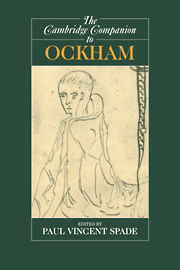Book contents
- Frontmatter
- Introduction
- 1 The Academic and Intellectual Worlds of Ockham
- 2 Some Aspects of Ockham's Logic
- 3 Semantics and Mental Language
- 4 Is There Synonymy in Ockham's Mental Language?
- 5 Ockhams' Nominalist Metaphysics
- 6 Ockham's Semantics and Ontology of the Categories
- 7 Ockham's Philosophy of Nature
- 8 The Mechanisms of Cognition
- 9 Ockham's Misunderstood Theory of Intuitive and Abstractive Cognition
- 10 Ockham's Ethical Theory
- 11 Ockham on Will, Nature, and Morality
- 12 Natural Law and Moral Omnipotence
- 13 The Political Writings
- 14 Ockham on Faith and Reason
- 15 Ockham's Repudiation of Pelagianism
- Bibliography
- Citations
- Index
14 - Ockham on Faith and Reason
Published online by Cambridge University Press: 28 May 2006
- Frontmatter
- Introduction
- 1 The Academic and Intellectual Worlds of Ockham
- 2 Some Aspects of Ockham's Logic
- 3 Semantics and Mental Language
- 4 Is There Synonymy in Ockham's Mental Language?
- 5 Ockhams' Nominalist Metaphysics
- 6 Ockham's Semantics and Ontology of the Categories
- 7 Ockham's Philosophy of Nature
- 8 The Mechanisms of Cognition
- 9 Ockham's Misunderstood Theory of Intuitive and Abstractive Cognition
- 10 Ockham's Ethical Theory
- 11 Ockham on Will, Nature, and Morality
- 12 Natural Law and Moral Omnipotence
- 13 The Political Writings
- 14 Ockham on Faith and Reason
- 15 Ockham's Repudiation of Pelagianism
- Bibliography
- Citations
- Index
Summary
Analytic philosophers specializing in medieval philosophy have tended to focus on those aspects of Catholic medieval thought that seem relevant to research programs already firmly established within the mainstream of contemporary academic philosophy. In this way they have tried to convince other philosophers that the Catholic medieval thinkers, despite their theological presuppositions, have something useful to contribute to current discussions. The tendency in question has been especially pronounced in the case of William of Ockham because he is at his best when doing ontology and philosophical semantics, two areas that have figured prominently in recent analytic philosophy and that seem safely removed from distinctively Catholic beliefs.
Undeniably, much valuable reflection on Catholic medieval thought has been generated by this desire to show how certain parts of the works of Ockham and the others might bear on contemporary problematics or even inspire us to reconfigure those problematics; indeed, many academic philosophers who would not otherwise have noticed the medievals have thereby been led to treat them as fullfledged interlocutors. Still, to limit ourselves to this fragmentary approach prevents us from understanding these thinkers as they understood themselves and renders us vulnerable to the abiding temptation to refashion their work so as to make it suit our own cultural and philosophical biases.
- Type
- Chapter
- Information
- The Cambridge Companion to Ockham , pp. 326 - 349Publisher: Cambridge University PressPrint publication year: 1999

